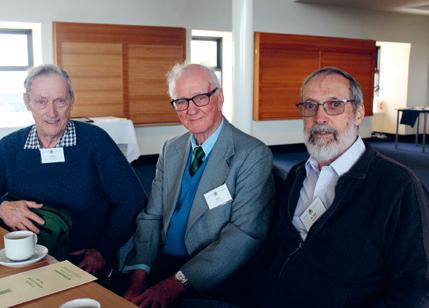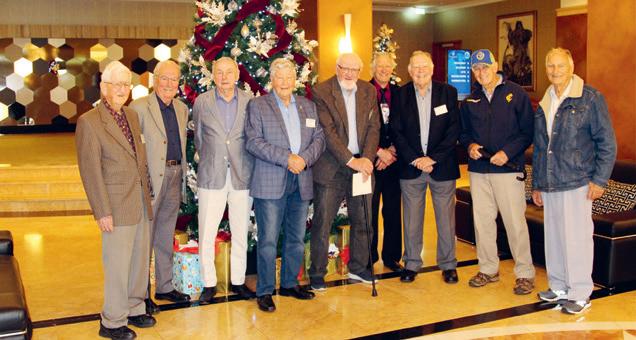
9 minute read
From the Principal
WELCOME TO THE SUMMER EDITION OF TRINITY NEWS
As this edition of the magazine is going to print during the Christmas holidays, I extend my best wishes for 2022. May the new year bring good health, happiness and wonderful opportunities. I sincerely thank everyone who contributed their time and energy to this College in 2021 and for continuing to make it a vibrant and inclusive community. Without the hard work and commitment of our community, the College would simply not be able to operate. Every year our TC Spirit grows stronger – thanks mostly to our wonderful community.
THE EREA TOUCHSTONES AND SCHOOL RENEWAL PROCESS
As a Catholic school in the Edmund Rice tradition, Trinity College embraces the four guiding Touchstones as outlined in the Charter of Edmund Rice Education Australia (EREA). The Touchstones perpetuate the legacy of Blessed Edmund Rice, the founder of the Christian Brothers and set out to capture the character and culture of all EREA schools. As part of our many liturgical celebrations, Religious Education curriculum, formation programs, College events and communications, the presence and understanding of these Touchstones are explored with a view to identifying how we can live them out in the context of today. At Trinity College, the Touchstones lay at the heart of our Mission: To offer innovative learning opportunities in a safe and nurturing environment which empowers our young men to realise their potential. As a Catholic College founded on the traditions of the Blessed Edmund Rice, his example of solidarity with all people challenges us to live out the message of care and inclusion. In partnership with parents, we hold high expectations for the young men in our care and we seek to provide a breadth of learning opportunities in a safe and caring environment, enabling academic growth, pride in their College and a commitment to serve others, both now and in the future. An education at Trinity should challenge our students to be independent thinkers with the courage and persistence to confront injustice in our society. It should challenge them to stand against the mediocrity so often prevalent in popular culture and encourage our young men to discover what has true worth in this world and to place real and ongoing value upon it. To foster this development, the College encourages a culture of critical thinking, resilience, selflessness, accountability, inclusivity and awareness of their role in stewardship – concepts that are clearly articulated in the Touchstones. To be effective in the formation of Men for Others, the Touchstones are designed to be active values with a view to becoming more deeply embedded in a student’s understanding of their own self and identity. That is, the Touchstones are engaging and dynamic which, when placed within an environment that is nurturing and supportive, encourages students to develop the confidence to immerse themselves into a way of being and thinking that seeks the good for others and ultimately themselves. Such experience can often be challenging and sometimes confronting, but the inevitable outcome is a deeper understanding and more authentic compassion and empathy for ‘the other’.
THE TOUCHSTONES: Liberating Education
We open hearts and minds, through quality teaching and learning experiences so that through critical reflection and engagement each person is hope-filled and free to build a better world for all. The Touchstone of Liberating Education builds awareness of injustice and marginalisation at a community and global level and seeks to enable students to challenge dominant cultural values. Skills such as critical reflection and independent thinking encourage confidence to confront injustice and the tenacity to persevere when challenged. In action, Christian Service Learning provides a particularly tangible commitment to this Touchstone, with students being able to engage in activities that assist members of their own communities and the wider society. Developing empathy for the marginalised cultivates an appreciation of privilege and a commitment to building a better world for all. Engaging in service gives students a true sense of integrity and purpose.
The notion of making a Trinity College education available to a range of families through an extensive Bursary program and the purposeful stewardship of our College resources has certainly been illustrated by retiring College Bursar, Michael Burgess. Over the past 22 years, Michael has overseen the College finances and, more importantly, he has kept the wellbeing and education of the boys as central. More of Michael’s generous legacy can be found elsewhere in this publication.
Gospel Spirituality
We invite all people into the story of Jesus and strive to make his message of compassion, justice and peace a living reality within our community. At Trinity College, we believe that Gospel values are immutable and may be embraced equally by people of all faiths. The teachings of Jesus promote the inherent dignity of all, while encouraging empathy and a commitment to action. Spirituality is considered to be a way of living that is open to and energised by a connection to the sacred love of God. By equipping students with a passion for justice, a heart for compassion and desire for peace as modelled by Christ, our students will be challenged to live with a spirit of gratitude and joy that respects the sacredness of all things and all people – to be Men for Others! Gospel Spirituality is honoured through the College’s liturgical celebrations that affirm our faith tradition and strong community spirit. Developing skills of reflective practice, prayer and discernment allows space for self-awareness and personal growth.
Inclusive Community
Our community is accepting and welcoming, fostering right relationships and committed to the common good. Building a better society begins with building positive relationships within our own College community. Nurturing the dignity of every member encourages open and honest connection which strengthens understanding. However, as stated earlier, this can be counter-cultural and may even challenge some of our own preconceived or acquired personal ideas. While such an approach can be unsettling and confronting, it can also offer the greatest opportunities for real growth. In the tradition of Blessed Edmund Rice, who was committed to breaking down barriers that perpetuate the social divisions of an unjust world, we should recognise and celebrate that for well over a hundred years, Trinity College has sought to offer accessible education and an extensive range of opportunities that provide students with the best possible environment to realise their potential, regardless of their background. The College honours this commitment at all levels, with pastoral programs, service opportunities and wellbeing and behavioural policies that nurture healthy relationships. Positive role-modelling and leadership from staff and senior students contribute to a climate of respect and friendship where students learn to appreciate their own role in building a welcoming and accepting community.
Justice and Solidarity
We are committed to justice and peace for all, grounded in a spirituality of action and reflection that calls us to stand in solidarity with those who are marginalised and the Earth itself. As a faith community, Trinity College is inspired by the deep humanity modelled by Jesus Christ who advocated for the marginalised and spoke out against all forms of injustice. In the light of the teachings of Jesus, we understand that God’s love extends to all of creation and we are called to live in respectful harmony with the Earth – to be good stewards. Trinity’s faith formation and religious identity brings authenticity to the College’s justice and service programs that provide countless opportunities for our students to open their hearts and minds to the plight of people in need in our community and beyond. Likewise, our outreach activities and various immersion experiences encourage the building of deep relationships of solidarity and a lasting commitment to justice and peace. It is wonderful that many of our young men have access to such opportunities. As a school, we are required to undergo a regular and detailed process of ‘renewal’. The School Renewal process seeks to examine our current practices to ensure that Trinity College is authentically living out the Touchstones. The School Renewal process for Trinity has been ongoing throughout the year and has included the completion of comprehensive student survey data and the provision of reports that addressed particular areas of the EREA Charter. This culminated in a three-day visit by the EREA School Renewal team at the end of the year. I look forward to sharing the final Renewal Report and the various commendations and recommendations with the College community when it is formally ratified early next year. However, the preliminary report certainly acknowledged our strong strategic improvement in recent years and hinted at our need to focus on more capital planning in the future. As outlined earlier, as a Catholic school in the Edmund Rice tradition, the rich message, mature learnings and ongoing challenge provided by the guiding Touchstones, should remain firmly in our vision. We should be proud of the findings that emerged from this School Renewal process. I look forward to welcoming all our new and current students and their families back in Term 1 and look forward to what will no doubt be an exciting and busy year for our College. Live Jesus in our hearts.
Mr Darren O’Neill
Principal
Class of 2021 and Head of Year student, Lucas Siciliano (12.7), set the example of being a Man for Others during his years at Trinity through his selfless and extensive commitment to ensuring the wellbeing of others. In 2021, Lucas highlighted the importance of mental health in young men through many initiatives and probably left his greatest legacy when he enticed several of his Class of 2021 peers and teachers to participate in the World’s Greatest Shave to raise important and muchneeded funds for blood cancer research.









